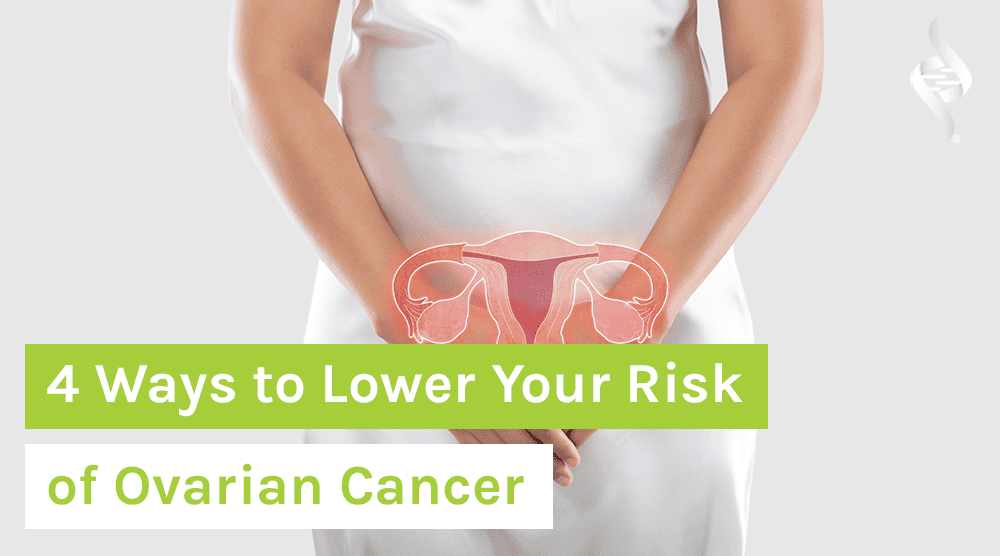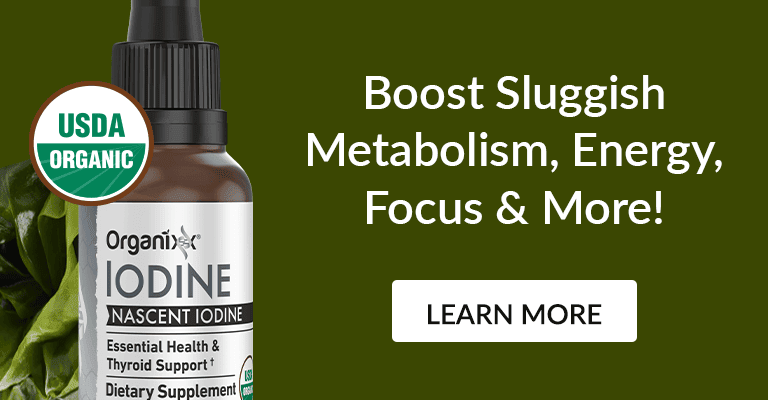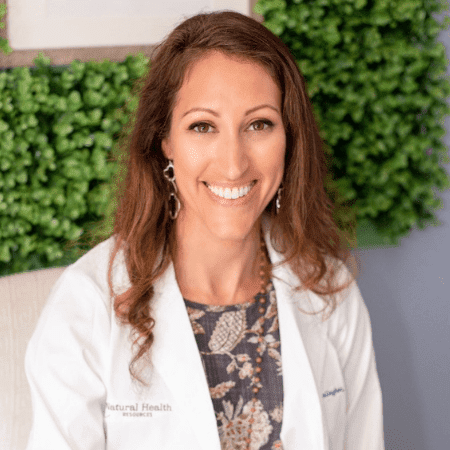4 Ways to Lower Your Risk of Ovarian Cancer
Video Transcript:
Today, let’s talk about ovarian cancer awareness. The silent killer in so many women, especially women in the post-menopausal category.
Optimal ovarian health is so important, and I want to share with you four really important tips and resources to lower your risk of ovarian cancer, and daily, weekly, and monthly resources you can deploy and implement in your life to help you support the most optimized ovarian health.
Applies to Women in All Life Stages
So first, before we begin, I really want to highlight that it does not matter if you are menstruating, ovulating, or in a post-menopausal state, as long as you have ovaries, it’s very important that we support their health. And that when your ovaries peter out and they’re no longer functional, they’re still there and they’re still in an operative state. They’re just not there in the functionality that they had been when we were in our fertile phase.
So, it’s really important, even if you are a post-menopausal woman, that you do routine scans, transvaginal ultrasounds[1], and have your ovaries checked on an annual basis, not just through a digital exam, but also transvaginal. It’s really important to view your ovaries.
1. Castor Oil Packs for Your Ovaries
Okay, so let’s kick off with these four tips. Number one, castor oil packing over your lower abdomen, targeting your left and right ovary, or ovaries, are very, very important. That’s a very important particular protocol and resource, in that when we castor oil pack your ovaries, you can have a more functional process of your ovaries.
It’s not uncommon that women have scarring, follicular-related scarring, scar tissue, they may have cysts, and they may even have an ovary that’s an abnormal size, and that can be common when we’re menstruating, and it can be common after the fact. But the state of your ovary, the size particularly, and any cystic or scar-related tissue will put you at a higher risk for ovarian cancer. So, if you’ve ever had a history of cysts, or ruptured cysts, or lesions, or abnormal sizing of your ovary, it’s really important that we castor oil pack on a weekly basis.
Even if you haven’t had those, castor oil packing, which is a topical application of an oil, castor oil-soaked pad or cloth that is heated externally and deploys the castor oil in through the dermal layer, and it’s so powerful. Castor oil is very dense, it gets past the skin and dermal layers, and infuses this rich, dense oil that has the capacity to basically massage and detox the organ and can reduce sizes of cysts and fibroids. I love this, particularly for all women who want to invigorate circulation, the blood flow, and the lymphatics around their ovaries.
2. Bring Your Ovaries Back Online
Number two. It’s really important that, especially for menstruating ladies, it’s important that we bring your ovaries online. And I say this meaning it’s not uncommon that the ovaries get offline. There’s a communication between ovaries, the brain, the ovaries and the thyroid, the ovaries and the adrenals that sometimes can get a little skewed and it can be taken offline very simply by stress, by chemical influences, by medication influences – birth control pill, thyroid medication – and also via cysts, ruptured cysts, and even menopause.
Some of the things we need to dial in, we want to bring our ovaries back online. We want to dial in your thyroid health, so you definitely want to test all of your thyroid hormone values because they’re going to greatly influence the functionality of your ovaries when you are menstruating. And even after the fact, for ladies who are post-menopausal and even ladies who may have had their ovaries removed, you still have tissue that is ovarian tissue that can be suspect and can turn into cancer.
What If You Don’t Have Ovaries?
I have patients who don’t have ovaries and have ovarian cancer. So, I just want to put that out there that it’s really important we bring your ovaries back online, connect those pathways and the communication between the other glandular tissue, so that we have the most optimized ovarian health.
And also, depending on your state, it may be something where if you’re a subclinical hypothyroidism, a drop or two of iodine, which we have here at Organixx, may be helpful in supporting the function of your ovarian health. So, just know: test, don’t guess, and always treat based on quantifiable lab data.
3. Eat a Low-Sugar Diet
Number three. This is really, really important. Practicing and consuming a low glycemic index diet – which is focused on treating, addressing, and balancing insulin resistance and glucose intolerance – is essential for optimal ovarian health. So, if you are in a pre-diabetic state, that will negatively impact your ovaries. So, if you are regularly monitoring via a glucose monitor on your arm, and if you aren’t, I recommend that, it’s so powerful.
Glucose is really the key for optimized aging and optimal health in all aspects of our body. When we analyze your glucose, it can tell us a lot about how open your cells are to glucose and insulin. And the ovaries are highly sensitive, very, very, very sensitive to insulin, the overwhelm of insulin.
So, if you have cortisol that’s elevated, lots of stress, imbalanced diet, and you might not be exercising, the likelihood is that your insulin, you’re showcasing, demonstrating signs of insulin resistance and glucose intolerance that will negatively impact your ovaries.
And many of my women who have cysts on their ovaries or lesions around the ovaries or follicular imbalances, the root cause of that state of the ovaries is going to be the insulin balance, insulin resistance. So, really important to evaluate that type of lifestyle and how you can incorporate the lowest glycemic index foods and really focus on balancing insulin resistance and glucose intolerance.
4. Be Aware of “Silent” Symptoms
And, last and final, one of the most important things here, because ovarian cancer is so silent, and I work with women all the time who have late-stage diagnoses that have had symptoms, but we don’t necessarily bring those to light that it may be an ovarian cancer or it might be an ovarian health problem.
Here are some symptoms to be aware of, and they can often be masked as IBS, gas and bloating, constipation. So, be aware that if you have any number or multiple symptoms here, it’s not a bad idea to give your OBGYN a call and get in and get a transvaginal ultrasound. That is a view of your ovaries, both left and right, or if you have one, we’ll view one, and we can look at the other cavity to identify any changes, any abnormalities that need to be analyzed.
Abnormal abdominal pain is very common. We will also have women that have bloating, so lower abdominal bloating. Now, this is really one of those things where it’s really common. A lot of women will have gas and bloating and they think they have IBS or candida problem, and that may be true, but they may also have some underlying ovarian imbalances or the ovarian health is showcasing some signs of imbalance.
The other thing are going to be, these symptoms are really key, changes in your bowel movement. So, any bowel changes, either you’ve gone from IBS-like symptoms to just full constipation for days, weeks on end, or changes in the bowel consistency, the color, frequency – all of the things that are different than your normal routine need to be noted as symptoms.
And then the other common, but also under-communicated symptom is frequent urination because a lot of times the early staging of ovarian dysfunction and even cellular changes to the ovaries, the ovaries will enlarge in size and depending on where your anatomy is and if you have a uterus or not, or if you had kids, the placement of your ovaries will impact and influence the state of your bladder health. And so, frequent urination can be an underlying symptom.
So, those are really key signs. If you check yes to all of those, do yourself, your peace of mind, a favor and call your OBGYN and ask to have a transvaginal ultrasound, a view of your ovaries, and tell them that you think you might be showcasing signs of ovarian distress. And that will be what you need to do when you call your doctor.
So, I hope these tips are helpful, ladies. Please share this video with all the ladies, friends, daughters, mothers, sisters, aunts, grandparents in your lives. This is really critical knowledge and we can reduce the silent killer by creating awareness. I look forward to answering any specific ovarian health questions you might have in future Ask the Doctor Melissa videos.
Organixx Iodine is a USDA Certified Organic, alcohol-free, and Certified Clean formula made with only pure nascent iodine and organic vegetable glycerin. Nascent iodine is the highly bioavailable, atomic form of iodine your body can readily absorb and use for thyroid and whole-body support.* Unlike conventional potassium iodide, which must be converted before use, nascent iodine is pre-activated for faster, more efficient utilization. Each drop is vegan, non-GMO, free from fillers and contaminants, and proudly made in the USA for uncompromising purity.*
*These statements have not been evaluated by the Food and Drug Administration. This product is not intended to diagnose, treat, cure or prevent any disease.






I saw this article today and I feel like I needed to read this. I am having a biopsy today for my uterus as i am having period like spotting every 6 months to a year but haven't had a regular cycle since 2017. The thing that caught my eye is that I am aware that I have many cysts on both ovaries, but I've never heard of castor oil packs?? Also, I recently have been contending with constipation and i rarely every have had that in my lifetime as i usually go twice a day. Something in my system feels off and I would love to get back on track. This article was informative and on time for me, thank you.
Can the scar tissue from the removal of an ovarian cyst also be a risk factor?
Hi Gwen, thanks for your question.
We are happy to provide you with a link to Ask the Doc - https://organixx.com/dr-m-bio/ where you have special access to submit any health questions you have for Dr. Melissa.
Please note, due to the number of entries we receive, we cannot guarantee that your specific question will be selected to be answered.
However, we will be providing frequent video responses from Dr. Melissa to respond to the many inquiries and topics that are important to so many of us. So please be on the lookout for emails that will announce when we release a new video from Dr. Melissa.
Also, if you’d like to get Dr. Melissa’s expert advice on a personal health situation, then Dr. Melissa has kindly offered the Organixx community a discount for booking a session with her. Feel free to schedule a discounted 30 or 60-minute session with Dr. Melissa, using the same link listed above.
Thanks so much. Wishing you all the best on your health & wellness journey.
Can thermography also detect ovarian stress or cysts, just as a transvaginal ultrasound can?
Hi Sharon, thanks for your question.
We are happy to provide you with a link to Ask the Doc - https://organixx.com/dr-m-bio/ where you have special access to submit any health questions you have for Dr. Melissa.
Please note, due to the number of entries we receive, we cannot guarantee that your specific question will be selected to be answered.
However, we will be providing frequent video responses from Dr. Melissa to respond to the many inquiries and topics that are important to so many of us. So please be on the lookout for emails that will announce when we release a new video from Dr. Melissa.
Also, if you’d like to get Dr. Melissa’s expert advice on a personal health situation, then Dr. Melissa has kindly offered the Organixx community a discount for booking a session with her. Feel free to schedule a discounted 30 or 60-minute session with Dr. Melissa, using the same link listed above.
Thanks so much. Wishing you all the best on your health & wellness journey.